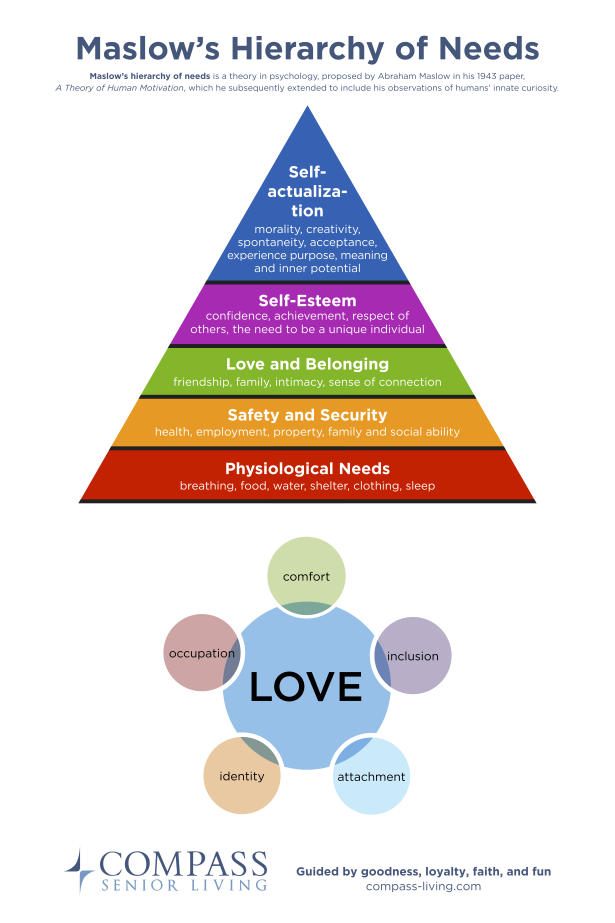 NEWS
NEWS
True Nort Living

The Needs Behind the Disease
“If you could tell her one thing, what would it be?”, I asked. “That I love her very much”, he said, as a tear streamed down his cheek.
I recently had the opportunity to spend time at a memory care community in Oregon. The day didn’t go as planned–at all. But, the lessons learned were far more valuable than any plan. We were able to get to know these wonderful people with a variety of different types of dementia and help them express themselves in ways they otherwise wouldn’t be able to.
One gentleman (we’ll call him Mr. Brown), was not particularly interested in joining the group for an activity. His dementia is progressed enough that he needs full-time care, but can still carry on a conversation. He has moments of lucidity and you may not otherwise know of his impairments until he is frustrated with a situation and lacks the ability to communicate his frustration except in somewhat aggressive tones or outbursts.
I sat in front of him and crouched down, so his head was just above mine and he could clearly see me. I had read through his history and talked with the staff about where he came from, his family, what he did for a living, etc. so I could step inside his perspective. Using the empathetic communication techniques I’ve learned over the years, I asked him a series of questions such as:
- Tell me about your wife.
- What is she like?
- If you could tell her one thing right now, what would it be?
- What is the best thing about her?
Through this prompting (you’ll notice I only used open-ended statements and questions), he told me about how wonderful she was and how much he loved her. Then, his deep underlying frustration began to show with the fact that he needed memory care and had to be there–when all he had worked for his entire life was to ensure they could spend the rest of their lives together. He proceeded to repeat a few times that he never took government assistance–a point of pride. He worked tirelessly to provide for his family (which was a rather large one) and ensure they could live a long life together.
He is heartbroken. Heartbroken that they won’t have that experience because of a disease that requires them to be apart. That is frustrating. That is miserable. It is understandable that he may have outbursts when he can’t thoughtfully express that frustration.
Needs investigation
We, as humans, have needs that must be fulfilled in order to be happy. We have needs that, if not met, can manifest themselves in strange behavior–often aggressive, overtly sexual, “inappropriate” for societal norms, or resulting in damage to our overall mental and physical well-being. Abraham Maslow’s (1908-1970) most lasting contribution to the field of psychology was the study of happiness. He determined that there is a hierarchy of needs that, as each of the needs are met, allows the human psyche to reach a state of happiness or self-actualization, as he calls it.
Individuals with Alzheimer’s or similar dementias still have the need to self-actualize, they just can’t do it on their own. One of the most powerful tools in our caring toolbox is to learn to identify the needs that cannot be expressed. Then, help the elder express that need or care for that need accordingly. Mr. Brown wasn’t an aggressive person, he was simply frustrated at the unfairness of the horrible disease that is keeping him from his wife. He has a need for love and intimacy from his wife. He has a need to feel useful in caring for those around him. There are so many ways that we can improve the quality of life for those with dementia–if we only begin to understand.

Empathy – An expression of non-judgemental love
You never really understand another person until you consider things from his point of view – until you climb inside of his skin and walk around in it. –Harper Lee
All we need is love ~ especially working in eldercare. The basic human need for love and belonging is an imperative to life!
According to the latest neuroscience research, 98% of people (the exceptions include those with psychopathic tendencies) have the ability to empathize wired into their brains – a capacity for stepping into the shoes of others and understanding their feelings and perspectives.
Empathy is a key ingredient of nurturing relationships and can forge loving and safe connections.
Here are some stories of empathetic communication break-through moments I have observed working with those living with dementia:
Paul is spending the entire morning walking the halls and calling out his wife’s name. “Dolly, Dolly, Dolly!” A well-meaning care team member says, “Dolly went shopping, she will be back later.” Paul begins to wail and scream her name, “Dolly, Dolly, Dolly!” He is looking for her everywhere and is very upset he can’t find her. Another care team member utilizing empathetic communication says, “Tell me about Dolly. What color are her eyes? What do you miss most about her?” After a few minutes, Paul says, “She has been gone a long time, I really miss her hugs.”
The first well meaning care team member has sympathy for Paul and told a ‘therapeutic lie‘. Paul knows deep inside that Dolly has been gone for 20 years, and he is communicating that he misses her. He was invited to share and release his deep feelings and heartbreak to the second care team member who listened with empathy and love.
Madeline starts pacing at 4:30 every afternoon to go home to her children. “I want to go home! I need to get home to my children!” A well-meaning care team member says, “Sit down. Everything’s OK. Let’s go have a cookie.” Madeline gets more and more nervous, agitated, and upset.Another care team member utilizing empathetic communication asks Madeline, “What is the worst thing that will happen if you can’t get home?” Madeline expresses her vivid memory of having left her children alone. Her fears are expressed to a trusted empathetic listener, and her painful feelings are diminished.
The first well meaning care team member has sympathy for Madeline, and she used ‘re-direction‘ to try to calm Madeline’s fears. Madeline is reliving a vivid memory of leaving her children alone at home. She needs to express her fears to an empathetic listener who is willing to enter Madeline’s reality to relieve her fears.
Listening with empathy builds trust, reduces anxiety and restores dignity. Painful feelings that are expressed and acknowledged by an empathetic listener will diminish.
Painful feelings that are ignored or suppressed will gain in strength. The power of empathy to connect and to relieve pain that is pent up inside can bring peace of mind to those living with dementia.
Empathy is an expression of non-judgemental love and a connection to another human being. Yes, indeed, love does belong in the workplace!
If these 8th graders, below, can define and act with empathy, we are all capable of acting with empathy. Listen to the wisdom of these children.
Words are but the vague shadows of the volumes we mean. Little audible links, they are, chaining together great inaudible feelings and purposes. –Theodore Dreiser
